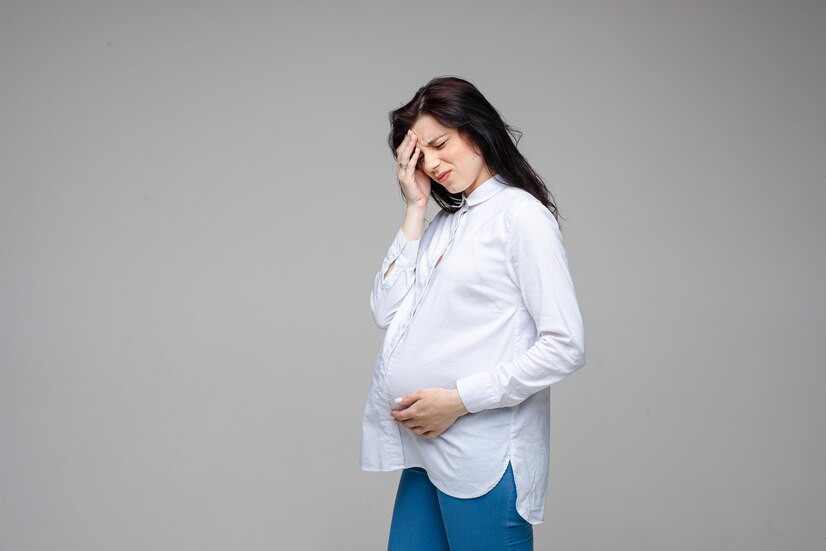High blood pressure, or hypertension, is a condition that can affect anyone, including pregnant women. In pregnant women, hypertension needs to be monitored closely as it can increase the risk of pregnancy complications such as preeclampsia and miscarriage. What are the causes of hypertension in pregnant women, and can this condition be managed? Let's delve into the following discussion.
What is hypertension in pregnant women?
A person is said to have high blood pressure or hypertension if they have a systolic blood pressure of 130–139 mmHg and a diastolic blood pressure of 80–89 mmHg or higher. During pregnancy, pregnant women may experience gestational hypertension if they did not have a history of hypertension before and only develop high blood pressure during pregnancy.
High blood pressure in pregnant women can occur at any time but typically occurs in the second trimester of pregnancy. After giving birth, the mother's blood pressure will return to normal. However, if the blood pressure remains high, it is advisable to consult a doctor.
Hypertension in pregnant women needs to be monitored closely because this condition sometimes does not cause symptoms. Untreated hypertension in pregnant women can increase the risk of pregnancy complications.
Complications of hypertension in pregnant women
Some complications of hypertension in pregnant women include:
Reduced blood flow to the placenta
Insufficient blood flow to the placenta can lead to the fetus not receiving enough oxygen and nutrients. This condition can result in fetal growth restriction, low birth weight, or premature birth. Babies born prematurely may experience respiratory problems, infection risks, and other complications.
Placental abruption
High blood pressure and preeclampsia can increase the risk of placental abruption, where the placenta detaches from the uterine wall before delivery. This condition can lead to severe bleeding that endangers the lives of both the mother and the fetus.
Intrauterine growth restriction (IUGR)
High blood pressure can also increase the risk of intrauterine growth restriction (IUGR), which is characterized by the fetus being smaller in size and weight despite being born at full term.
Injury to other organs
Poorly controlled high blood pressure can cause injury to the brain, eyes, heart, lungs, kidneys, liver, and other major organs. In severe cases, this condition can lead to fetal death.
Premature birth
If high blood pressure during pregnancy is not properly managed, doctors may recommend early delivery to prevent further complications that could lead to maternal and fetal death.
Risk of cardiovascular disease
Pregnant women with preeclampsia may increase their risk of future cardiovascular diseases. This risk is heightened if you have experienced preeclampsia more than once and have previously delivered prematurely due to high blood pressure during pregnancy.
Management of hypertension in pregnancy
There are several ways to reduce the risk of hypertension complications during pregnancy, including:
- Regularly monitoring blood pressure at home
- Taking blood pressure-lowering medications
- Reducing consumption of foods and beverages that may increase blood pressure
- Increasing rest and relaxation
- The goal of this management is to lower blood pressure or prevent the condition from worsening and causing complications. If you show signs of complications, it is advisable to consult a doctor promptly
Hypertension during pregnancy can lead to pregnancy complications that pose risks to the mother and fetus. If you have high blood pressure during pregnancy, regular prenatal check-ups are recommended.
If you need medical advice or consultation, you can either visit a doctor or make use of the consultation features that are available in the Ai Care application by downloading the Ai Care application from the App Store or Play Store.
Looking for more information about pregnancy, breastfeeding, and the health of women and children? Click here!
- dr. Monica Salim
Mayo Clinic. High blood pressure and pregnancy: Know the facts. Available from: https://www.mayoclinic.org/healthy-lifestyle/pregnancy-week-by-week/in-depth/pregnancy/art-20046098#
Cleveland Clinic. High Blood Pressure (Hypertension) During Pregnancy. Available from: https://my.clevelandclinic.org/health/diseases/4497-gestational-hypertension
CDC: High Blood Pressure During Pregnancy. Available from: https://www.cdc.gov/bloodpressure/pregnancy.htm











